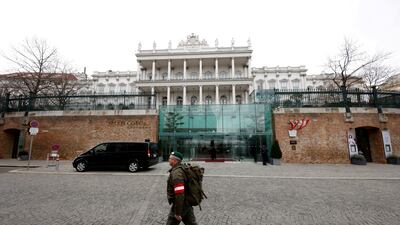France, Germany and the UK have said a nearly completed Iran nuclear deal is at risk of collapse, with the three European powers (E3) appearing to point the blame at Russia.
For nearly a year, negotiators have been engaged in multiple rounds of talks in Vienna, seeking to resurrect the 2015 deal that Iran signed with world powers. Officially known as the Joint Comprehensive Plan of Action, it gave Tehran sanctions relief in return for curbs on its nuclear programme. The West fears Iran is seeking an atom bomb, something Tehran denies.
A deal had looked close, but last Saturday Russian Foreign Minister Sergey Lavrov demanded sweeping guarantees Russian trade with Iran would not be affected by sanctions imposed on Moscow over its invasion of Ukraine.
On Friday the EU, which has convened the talks, said they would be paused “due to external factors”.
“A fair and comprehensive deal is on the table ready for conclusion, which is the reason why the E3 negotiators left Vienna last week, their job being done,” the E3 said on Saturday.
“It is our understanding that Iran and the US have worked hard to resolve final bilateral issues and so we are ready to conclude this deal now.
“Nobody should seek to exploit JCPoA negotiations to obtain assurances that are separate to the JCPoA. This risks the collapse of the deal, depriving the Iranian people of sanctions lifting and the international community of the assurance needed on Iran’s nuclear programme.”
They said the nuclear deal “on the table can and should be concluded with the utmost urgency”.
Tehran on Thursday suggested there were new obstacles to reviving the deal. Washington underlined it had no intention of accommodating Russia's demands, which it said have nothing to do with the Iran talks.
Iran signed the 2015 deal with China, the E3, Russia and the US.
But in 2018 the-then US president Donald Trump unilaterally withdrew from it and reimposed heavy economic sanctions on Iran.
In response, Tehran ramped up its nuclear activities.
Russia's envoy to the talks, Mikhail Ulyanov, dismissed suggestions Moscow was the reason the talks had stalled.
“The conclusion of the deal does not depend on Russia only,” he told reporters after meeting EU co-ordinator Enrique Mora. “There are other actors who need additional time and who have additional concerns, and they are being discussed.”










